Hormones
All information about "Hormones" and the related magazine articles can be found here.
Our articles are written clearly and link to scientific studies where relevant. This is how we meet our own standards: we regularly deliver new, high-quality content for you—free of charge, no sign-up required, with the highest possible benefit to you.
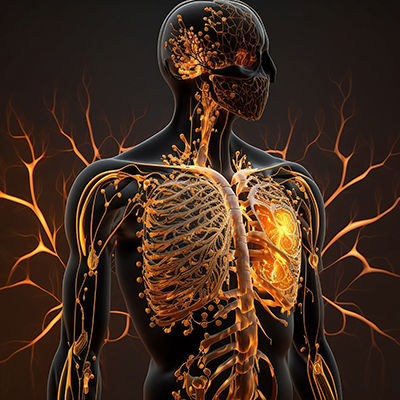
Mysterious autoimmune disorders
When the immune system gets out of control.
Find out what happens when the immune system suddenly attacks the body's own cells, what diseases there are and what symptoms you should take seriously in order to be able to act early.

Citrulline – the natural energy booster
Find out how citrulline can help support your performance and endurance in everyday life.
Citrulline can support your energy and endurance, promote recovery and improve blood flow. Discover how this amino acid derivative can help you in your daily life.
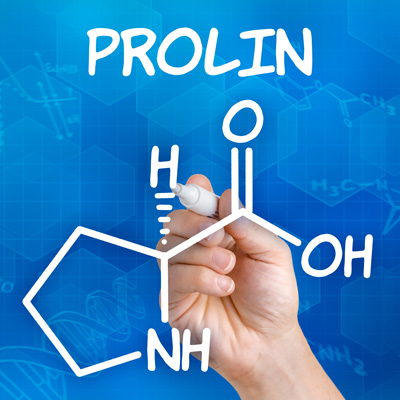
Proline: the building block for healthy joints
Discover the benefits of proline for your joints, skin and connective tissue.
Proline is an amino acid that plays an important role in healthy joints, skin and connective tissue. Find out how proline can help strengthen your joints and keep your skin elastic. Immerse yourself in the world of amino acids and their benefits for your health!

Fibromyalgia: living with chronic pain
Understand, relieve and live better - your source of knowledge and support for fibromyalgia.
Fibromyalgia affects millions of people worldwide and causes chronic pain, fatigue and sleep disorders. Find out what treatment options are available to alleviate symptoms and improve quality of life. Discover tips and strategies for a better well-being.
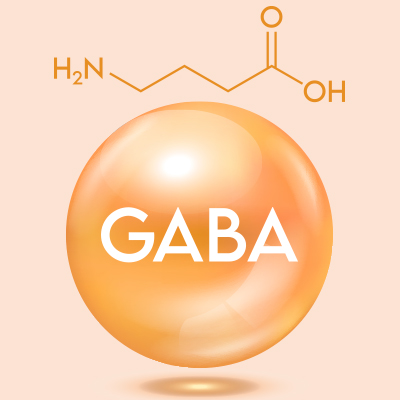
Say goodbye to stress - hello GABA!
Do you often feel stressed and overworked? GABA, a natural neurotransmitter, could be the solution. Find out how GABA helps your body to reduce stress, calm your nerves and promote a feeling of deep relaxation.

D-Ribose Power-Smoothie
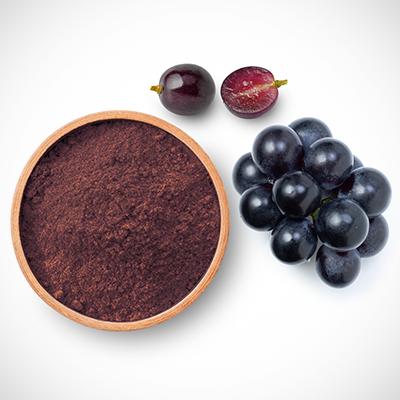
OPC - antioxidants for better health!
Why OPC can fight oxidative stress
Every day we fuel our health with negative influences, sometimes consciously, sometimes unconsciously. Find out here how oxidative stress damages our body and how oligomeric proanthocyanidins (OPC) can strengthen it.

Astaxanthin - the "super antioxidant"?
Good for skin, joints and immune system
Astaxanthin is said to have a greater effect than other carotenoids, vitamin E and even vitamin C - what's behind this?
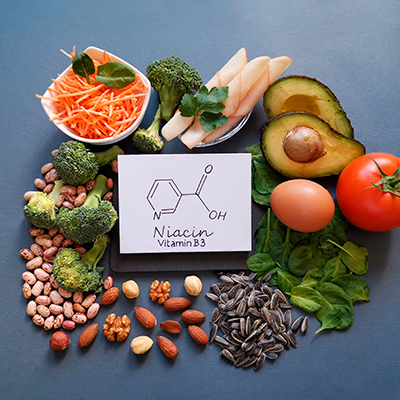
Niacin - a versatile B vitamin!
This is how vitamin B3 works in the body
As an essential vitamin, niacin plays an important role in the human body. But what exactly is this nutrient and how can it benefit our health?

D-Ribose - a natural power up
From the muscles to the heart: D-ribose is of great importance for our health and performance. As a component of all human cells, it is essential for the body's energy supply and regeneration. Health-conscious people and athletes therefore rely on this natural option to support their vitality and their cells. Find out more about D-ribose here now!
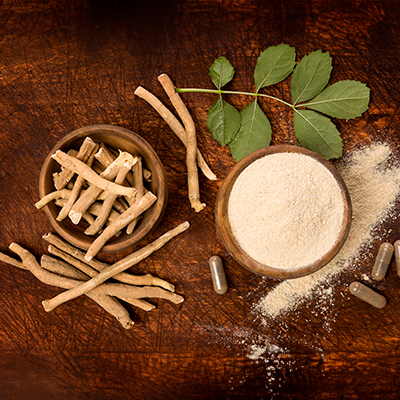
Ashwagandha - a real health all-rounder?
The powder from the sleeping berry is an integral part of Ayurvedic medicine and is valued for its many health-promoting properties. Read more now.

All you need to know about vitamin A
Vitamin A - also known as retinol - has become an important ingredient in anti-ageing skincare products. But it also has many other benefits.

Not in the mood for anything?
Listlessness, apathy, fatigue - seemingly harmless terms that can drastically reduce the quality of life of those who suffer from them. How these complaints differ and what diseases and causes may be behind them.

How creatine affects fitness
Creatine is primarily known for its effect on muscle building - but it plays a far more versatile role in the human body. We have summarised everything you need to know about this special substance for you in this article.
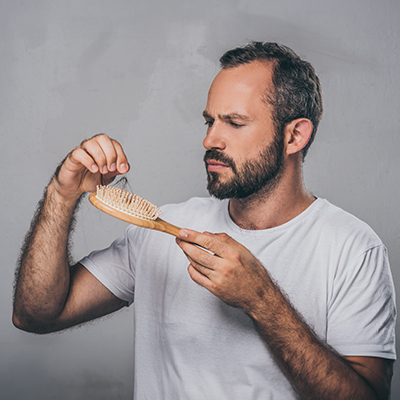
These conditions can cause hair loss
Hair loss, sudden hair loss, circular hair loss - when the hair on your head disappears, it can be a huge psychological burden for many people. What diseases can cause hair loss.
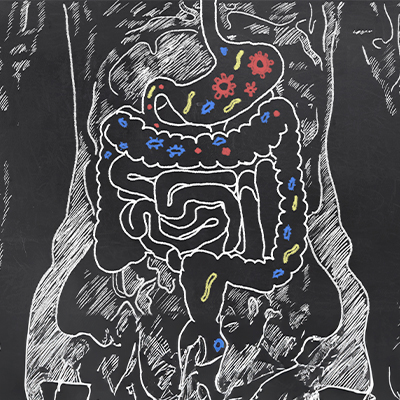
All you need to know about gut health
Intestinal health not only affects digestion, but also your overall wellbeing. Find out more now.
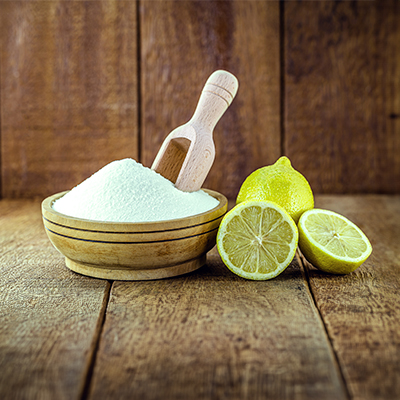
Home remedies for heartburn
Burning, heartburn, pain: almost everyone is familiar with heartburn. Taking a look at your lifestyle and diet can help manage the symptoms. Find out now how you can get relief in just a few steps!

Glycine regenerates body and mind
As an important amino acid, glycine is involved in many processes in the body and can have a positive effect on both physical and mental health. Muscles, skin, stress and psyche: find out more about the extensive areas of application and effects of this amino acid here.

How to recognise the symptoms of a vitamin deficiency
Permanent tiredness, mood swings, digestive problems and hair loss - vitamin deficiency can manifest itself in many unspecific symptoms. Find out which ones you shouldn't ignore.
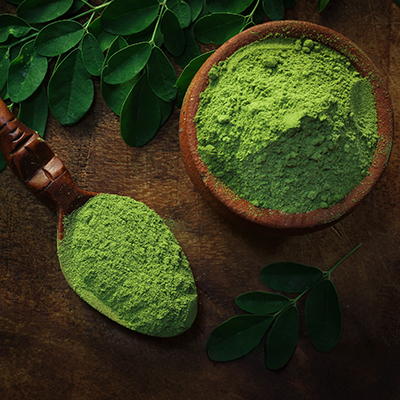
Is Moringa a real "superfood"?

This is how versatile the micronutrient choline is in the body
The vitaminoid is a real all-rounder & is used in many places in the body as a cell building block. A deficiency has major health implications.

Omega 3 for your skin, heart and brain
Omega-3 fatty acids are found in some foods, including fish. If you have an unbalanced or vegetarian diet, omega-3 capsules are a sensible alternative to ensure you get enough of the fatty acid. Find out more about the many benefits of an optimal omega-3 intake and how a deficiency can become apparent.
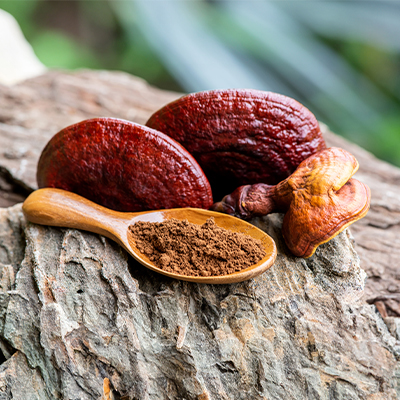
Reishi - a medicinal mushroom with thousands of years of tradition
What makes Reishi so special? Reishi has a long history in Traditional Chinese Medicine (TCM) and is now gaining popularity worldwide as a medicinal mushroom with positive health effects. Find out more about its many uses, the scientific research and the potential benefits attributed to it.

How L-carnitine works in energy metabolism
Carnitine is mainly found in animal foods and plays an important role in energy metabolism. Find out more now.
All about Hormones: Your Key to a Balanced Life
Have you ever wondered why you sometimes feel energised and focused, while other days you are tired and irritable? The answer often lies in the complex workings of our hormones. They work in the background and influence our organs and our well-being. In our guide to hormones – the key to a balanced life – you will learn how these invisible regulators shape your everyday life and how you can optimise your hormonal balance to get the best out of every day.
What role do hormones play in the human body?
The human hormone system has a very complex structure. The most important hormones play a central role in controlling and regulating a variety of vital bodily functions: These chemical messengers are produced by various endocrine glands (hormone glands) and released into the bloodstream to interact with specific target cells in the body and achieve a specific effect.
Through these interactions, the important neurotransmitters influence a variety of processes, including body growth and development, metabolic functions, reproduction, mood and responses to stress [9]. They also help to adjust the body to external and internal changes and maintain a homeostatic balance [9]. In short, the hormonal system is crucial for maintaining a healthy and functioning organism.
How are hormones produced and regulated?
Various hormones regulate our metabolism, body temperature, salt and water balance, circulation, behaviour and much more [1]. But how does the body know which different hormones it should produce in order to be in balance? Hormones are produced by hormone glands (endocrine glands). These glands, such as the thyroid, adrenal glands and pancreas, are part of the endocrine system and are responsible for synthesising and releasing specific hormones. The production and release of our own hormones occurs in response to complex feedback mechanisms that are influenced by various factors such as the nervous system, other hormones in the body and external environmental factors [4].
This regulation ensures that hormone levels remain within an optimal range to support the body's functions. So-called regulatory circuits control the production of most hormones. The various endocrine glands stimulate or inhibit each other [7]. Hormones can also act on their own gland of origin or a higher-level gland and influence the quantity of hormones. Many hormones of the hypothalamus are also regulated with the help of such ‘feedback loops’, in which the amount of a hormone that has already been produced promotes or curbs its own production. The hypothalamus is a part of the brain that plays an important role in controlling the endocrine system, producing hormones that stimulate or inhibit the pituitary gland to release other hormones [7].
What are the different types of hormones?
There are different types of hormones in the body, including steroid hormones, peptide hormones, amino acid derivatives and thyroid hormones [9]. These are produced by various endocrine glands (hormonal glands) and tissues and regulate a variety of physiological processes. Steroid hormones such as oestrogen and testosterone influence reproductive and metabolic functions.
Peptide hormones such as insulin and glucagon are crucial for the regulation of blood sugar levels and energy metabolism. Amino acid derivatives such as adrenaline and thyroxine have an effect on metabolism, heart rate and energy production. Thyroid hormones such as thyroxine regulate metabolic functions and body growth.
How do hormones affect mood and emotions?
Certain hormones influence mood and emotions by acting on the nervous system and the brain [9]. Serotonin, for example, a neurotransmitter often associated with happiness and well-being, can be influenced by hormones. An imbalance of cortisol, for example, which is released during stress, can lead to mood swings. Certain hormones such as oestrogen and progesterone, which vary during the menstrual cycle, can also affect mood.
What are the effects of hormones on metabolism and weight?
Other hormones such as insulin, thyroid hormones and cortisol directly affect metabolism by controlling the absorption, storage and utilisation of nutrients such as carbohydrates, fats and proteins [10]. Insulin, for example, lowers blood glucose levels by transporting glucose from the blood into the cells where it is used for energy or stored as glycogen.
An imbalance of these hormones can affect metabolic processes in the endocrine system, which can lead to metabolic disorders such as diabetes or hypothyroidism, which in turn can be linked to weight gain [11]. Certain hormones such as leptin and ghrelin influence feelings of hunger and satiety by signalling to the brain when we should eat and when we feel full. If this regulatory system is disrupted, this can lead to food cravings, overeating and weight gain.
What influence do hormones have on the menstrual cycle?
Hormones such as oestrogen and progesterone regulate the menstrual cycle. During the cycle, hormone levels rise and fall, which influences ovulation, the thickness of the uterine lining and the onset of menstruation. At the beginning of the menstrual cycle, the ovaries tend to produce less oestrogen, whereas shortly before ovulation they produce a lot [2]. Oestrogen stimulates the formation of the uterine lining, while progesterone supports its build-up and is important for preparing for a possible pregnancy. If fertilisation does not take place, hormone levels fall, which leads to the shedding of the uterine lining and the onset of menstruation.
Many women find the time before and during their menstruation problematic and painful. Find out here how magnesium can support you with menstrual cramps.
How can hormones influence growth and development?
Hormones play an essential role in human growth and body development by regulating various organ systems and controlling important processes such as bone growth, muscle development and reproductive maturation. Testosterone in particular is crucial as it regulates sex differentiation during embryonic development and puberty, promotes secondary sexual characteristics such as penile growth and sperm production, influences the transformation of vellus hair into mature hair follicles and supports both muscle growth and bone formation [3].
What endocrine disorders are there and how are they treated?
There are various disorders of the endocrine system that can affect the body and health. Some of the most common hormonal disorders are [12]:
Underactive thyroid (hypothyroidism): This is where the thyroid gland does not produce enough of the thyroid hormone thyroxine, which can lead to symptoms such as fatigue, weight gain and dry skin. The thyroid gland is often treated by taking thyroid hormone supplements. Selenium can also be used as a supportive measure.
Hyperthyroidism (overactive thyroid): This is the opposite of hypothyroidism, in which the thyroid gland produces too much thyroid hormone thyroxine. Symptoms can include weight loss, nervousness and an accelerated heartbeat. Treatment may include medication, radioiodine therapy or, in some cases, surgery.
Diabetes: Diabetes is a metabolic disorder characterised by a lack of insulin or insulin resistance. Treatment often involves a combination of dietary changes, physical activity, medication and insulin injections.
Adrenal insufficiency: With this problem, the adrenal glands do not produce enough hormones such as cortisol and aldosterone. Treatment usually consists of lifelong intake of hormone replacement preparations.
Pituitary disorders: The pituitary gland in the brain produces various hormones that regulate the human body. It is controlled by the hypothalamus. Impairments in this area can lead to a variety of problems, including an imbalance in other hormone production. Treatment depends on the specific impairment of the endocrine system and may include the administration of replacement hormones, medication or, in some cases, surgery.
The treatment of endocrine disorders is usually carried out under medical supervision and is based on the identification of the underlying cause and a personalised therapy.
What role do hormones play during pregnancy?
During pregnancy, hormones play a crucial role in the regulation of various physiological processes. They not only influence the development of the foetus, but also the adaptation of the mother's organs to the pregnancy. Hormones such as oestrogen and progesterone help to build up the uterine lining and prepare it for implantation of the fertilised egg [13].
During pregnancy, the body also produces hormones such as hCG (human chorionic gonadotropin), which supports the production of progesterone and maintains the pregnancy. Other hormones such as prolactin prepare the breasts for milk production [13]. Overall, hormones regulate a variety of processes during pregnancy that are crucial for the well-being of mother and child. Hormone production takes place in various organs such as the ovaries and the pituitary gland.
How can we regulate and balance hormones naturally?
Regulating and balancing hormones can be achieved naturally through various lifestyle and dietary adjustments:
Regular physical activity: exercise can help regulate hormone levels and improve well-being [14].
Adequate sleep: An adequate amount of sleep is crucial for hormone production and maintaining balance [15].
Stress management techniques: Meditation, yoga and relaxation exercises can help reduce stress and support hormone balance [16].
Balanced diet: A diet rich in vegetables, fruit, wholemeal products and healthy fats can help regulate hormones [17]. Try an alkaline diet.
Limit sugary and processed foods: Reducing sugary and processed foods can help minimise fluctuations in blood sugar levels and improve hormone balance [17].
Certain herbs, supplements such as omega-3 fatty acids and vitamins can also support hormone balance. However, before taking supplements, it is advisable to consult a doctor to consider possible interactions or contraindications.
[1] https://www.internisten-im-netz.de/fachgebiete/hormone-stoffwechsel/regulation-der-hormone.html
[2] https://www.internisten-im-netz.de/fachgebiete/hormone-stoffwechsel/hormondruesen-und-moegliche-erkrankungen/hypothalamus/
[3] https://www.hormonspezialisten.de/sexualhormone/testosteron/funktionen
[4] https://www.studysmarter.de/studium/medizin/innere-medizin/endokrines-system/
[5] https://www.msdmanuals.com/de-de/profi/endokrine-und-metabolische-krankheiten/grundlagen-der-endokrinologie/%C3%BCbersicht-%C3%BCber-das-endokrine-system
[6] https://flexikon.doccheck.com/de/Endokrines_System
[7] https://www.spektrum.de/lexikon/ernaehrung/endokrine-regulation/2470
[8] https://www.bund.net/fileadmin/user_upload_bund/publikationen/fluesse/fluesse_hormonaktive_substanzen_hintergrund.pdf
[9] https://www.endocrine.org/-/media/endocrine/files/patient-engagement/misc_other/hormone_guide_5x5_grid_25x25_english.pdf
[10] https://pubmed.ncbi.nlm.nih.gov/9556085/
[11] https://www.deutsches-schilddruesenzentrum.de/gut-leben-mit-diabetes-experteninterview-mit-prof-zieren/
[12] https://www.frauenaerzte-im-netz.de/erkrankungen/hormonstoerungen/therapie/
[13] https://www.yourhormones.info/topical-issues/hormones-of-pregnancy-and-labour/
[14] https://www.tk.de/techniker/magazin/life-balance/aktiv-entspannen/stress-abbauen-mit-sport-und-bewegung-2093232?tkcm=ab
[15] https://www.aerzteblatt.de/archiv/1375/Neue-Erkenntnisse-der-Chronobiologie-Wie-Hormone-Schlaf-und-Stoffwechsel-regulieren
[16] https://www.daserste.de/information/wissen-kultur/w-wie-wissen/sendung/2012/entspannung-102.html
[17] https://www.hans-riegel-fachpreise.com/fileadmin/hans-riegel-fachpreise/Module/ausgezeichnete-arbeiten/hans-riegel-fachpreise-seminararbeit-vwa-2020-Rathke.pdf
